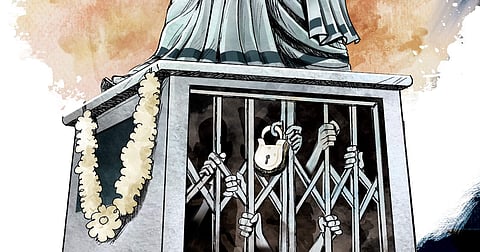

A part from the dreaded heat that June brings with it, the month also brings back painful memories of the despotic Emergency that Congress Prime Minister Indira Gandhi imposed on the country on 25 June 1975. The move turned a vibrant democracy into a dictatorship and snatched away not just the fundamental rights of citizens but also the right to life itself. If we are to preserve our democratic way of life, we need to recall the events of 1975-77. We must also make a list of things relating to the Emergency which we should never forget and also a list of incidents we should never forgive. So, here goes:
We should never forget: The sacrifices of a large number of political and social leaders and workers who risked their lives and fought against the autocratic regime and eventually put democracy back on the rails in March 1977. Among them were Jayaprakash Narayan, Atal Bihari Vajpayee, Chandra Shekhar, George Fernandes, L K Advani, Charan Singh, Madhu Dandavate, Morarji Desai, Nanaji Deshmukh, Ramakrishna Hegde, Sikander Bhakt, Narendra Modi, H D Deve
Gowda, Lalu Prasad Yadav and Nitish Kumar.
The role of the RSS in the restoration of democracy in the country. Of the 6,330 political activists jailed under the much-feared Maintenance of Internal Security Act (MISA), 4,026 belonged to the RSS and the Jan Sangh (predecessor to the BJP). Among them—apart from some of those named above—were the then RSS Sarsanghchalak Balasaheb Deoras, Venkaiah Naidu, the current vice president of India, union ministers Arun Jaitley, Ravishankar Prasad, Prakash Javadekar, Ananth Kumar, Ram Vilas Paswan and senior RSS leader Dattatreya Hosabale. Dr Subramanian Swamy, now an MP, slipped out of the country twice and launched campaigns against Indira’s dictatorship in the US and UK. Prime Minister Narendra Modi, then an RSS pracharak, was part of the underground movement, organising resistance, producing anti-Emergency literature and helping the families of the jailed leaders.
Justice H R Khanna, the sole dissenting judge in ADM, Jabalpur vs. Shiv Kant Shukla Case (also known as the Habeas Corpus Case) in the Supreme Court. The court had to determine whether a citizen had the right to move courts to safeguard his right to life and personal liberty under Article 21. This is the bedrock of a democratic Constitution. As the Attorney General, Niren De, pressed for acceptance of the government’s view that the citizens did not have the right to life and personal liberty, Justice Khanna asked him if there could be no judicial remedy if a cop killed a person out of personal enmity. Niren De said, “Yes, there would be no judicial remedy.”
Those in the courtroom were stunned to hear this and Justice Khanna recalls in his autobiography that the other judges on the bench—Chief Justice A N Ray and Justices M H Beg, Y V Chandrachud and P N Bhagwati—sat tongue-tied when this was going on. Eventually, these four judges upheld the government’s view and snatched away the citizen’s right to life and personal liberty. Some months later, Justice Beg was appointed the chief justice—superseding Khanna—by Indira. That is why Justice Khanna remains a hero for all those who value democracy and fundamental rights.
We should not forgive: Indira Gandhi, for turning a democracy into a dictatorship; for forcible sterilisation of the population; for amending the Constitution and election laws just to protect herself; for bringing in the 42nd Amendment to cripple the higher judiciary; and for empowering the president to amend the Constitution through executive orders.
The Kerala policemen who brutally tortured and murdered P Rajan, a student of the Regional Engineering College, Calicut but went unpunished. The Karnataka cops who tortured Lawrence Fernandes for months but went unpunished. V C Shukla, the minister for information and broadcasting in the Indira government, who threatened journalists, imposed censorship, passed draconian anti-press laws that empowered district magistrates to raid newspaper offices. He ordered the All India Radio not to broadcast any song sung by Kishore Kumar because the artist refused to sing a song for a government advertisement.
Justice Beg, for his deplorable observation in the ‘Habeas Corpus’ judgment, that Indira was taking “maternal care” of the political prisoners. He said, “We understand the care and concern bestowed by the state authorities upon the welfare of detenus who are well-fed and well-treated, is almost maternal.”
Navin Chawla, then the secretary to the lieutenant governor of Delhi, Kishan Chand, who became an extra-constitutional authority. He directed Tihar Jail to “bake” political prisoners in cells with asbestos roofs. He also directed that some of the detenus “should be kept with the lunatics”.
Bansi Lal, then the chief minister of Haryana and later defence minister, who behaved like a medieval despot. He personally supervised mass sterilisation camps, the most terrifying example of which was the assault on Uttawar village, largely populated by Muslims in Haryana. Cops arrived in trucks, surrounded the village, pulled out every male resident from age 8 to 80 and took them to a camp where they were forcibly vasectomised. In most of the northern states, school teachers and policemen were given sterilisation quotas. In many cases, the teachers themselves had to undergo vasectomy. Those who refused were jailed under the dreaded MISA.
This in no case is the complete list. But, if we fail to remember the villains of the Emergency and draw the right lessons from those days of repression, we will not be able to protect and preserve our democratic way of life.
A Surya Prakash
Chairman, Prasar Bharati
Email: suryamedia@gmail.com